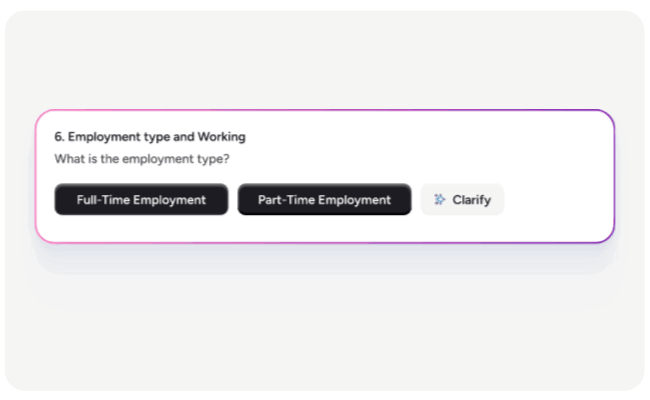
Create a Professional Employment Contract in Minutes

Contents
Employment Contract – Free Builder & Template
Sisältö
Your employment contract is where you’ll find all the terms of your employment, from your contracted hours per week, to your rate of pay, to your role expectations. Keeping a copy of your employment contract handy is useful for everything from disputes around your role to claiming annual leave you’re entitled to.
In this article, we’ll explain what an employment contract is, what the key terms you can expect to find in it are, and what your rights are as an employee in the UK - even if these aren’t explicitly set out in your employment contract.
Creating an Employment Contract
Hiring someone new for your business, especially your first employee, is a big step. You've probably sorted the salary and job details, but now it's time to make things official with a proper employment contract.
But how do you put it all down in black and white, so everyone understands and agrees?
The old way can be a real headache. We've all been there:
- You dig out an old contract (maybe your own, or something you found online) and start copying and pasting.
- You frantically Google things like holiday entitlement, trying to figure out the legal bits and bobs.
- After countless drafts (personname_final_lastversion_v3, anyone?), you finally email it off to the applicant.
- Then, the questions start rolling in – questions you can't answer because, well, you just copied and pasted the original!
- And finally, the signing… another logistical puzzle.
It's a hassle, isn't it?
The new way
But in this day and age, creating a contract shouldn't be such a chore. That's where Bind by aatos comes in. We're a contract builder (or whatever you want to call us!) that simplifies the whole process.
Just start a new document, answer a few straightforward questions, and hey presto! A professionally formatted contract, ready for signing.
You can even sign it yourself and send it to the other party for their signature, all within the same platform.
And the best part? Your first document is completely free.
So, if you're looking to create a professional employment contract, why not give Bind a try? Create an Employment Contract >
And because it's fully customisable, Bind has you covered whether you're hiring full-time, part-time, on a zero-hour basis, or any other type of contract.
What is an Employment Contract?
An employment contract is a formal agreement that outlines the terms of employment between an employee and employer.
This is the most important document an employee can have as it clearly defines what the employer expects from the employee and vice versa, as well as key terms of the employment relationship like contracted hours and rate of pay.
Setting out these terms and conditions in a written document is the best way to prevent misunderstandings and provide legal protection for both parties, and there are plenty of UK employment contract templates online that you can use as a starting point.
Employment Contract Template
Although every contract of employment is unique, there are a few key elements that should be contained in every sample employment contract template:
Job Details
Specify the job title and outline the duties expected of the employee to support the fair assessment of their job performance.
Compensation and Benefits
Detail the salary, any potential bonuses, and benefits such as health insurance, retirement plans, and other perks.
Working Hours and Conditions
Define the regular working hours, flexibility options like remote work, and the work environment. This section helps set boundaries and manage expectations on both ends.
Termination Conditions
Clearly state the conditions under which the employment can be terminated, such as the notice period required from either side and the procedures for handling disciplinary or redundancy proceedings.
Confidentiality
Including a confidentiality clause protects sensitive company information, ensuring that employees understand their data protection obligations.
Non-compete Clauses
These clauses prevent employees from entering into competition with the employer during or after their employment period, for example by banning them from working for a direct competitor. These clauses are most relevant for highly skilled professionals.
Dispute Resolution
Outline the agreed-upon methods for resolving disputes, including the employee disciplinary and grievance procedures.
💡 Did you know that you can sign employment contracts with using electronic signature?
Legal Requirements for Employment Contracts (Under UK Employment Law)
Although most employment contracts state many of the employee’s rights under UK employment law, there are rights which exist for employees in the UK regardless of whether or not they are mentioned in the contract. These include for example safe working environment, protection against discrimination, entitlement to leave, protection from unfair dismissal.
Safe Working Environment
Every employee is entitled to a safe and healthy working environment. Employers are required to ensure that the workplace meets all safety standards and is free from hazards that could cause harm.
Protection Against Discrimination
Employees are protected under the law from discrimination based on age, gender, race, religion, disability, and other protected characteristics.
For example, if an employee requires adjustments due to a disability, like an ergonomic desk setup, or longer deadlines to complete tasks, the employer must provide reasonable accommodations to support the employee’s needs.
This ensures that all employees in the UK have equal opportunities in the workplace and are treated with fairness and respect.
Entitlement to Leave
Employees have the right to various types of leave. This includes annual leave, maternity and paternity leave, and sick leave. For example, while employers can require advance notice or restrict leave during peak business periods, they cannot unreasonably deny the use of entitled annual leave.
These provisions ensure that employees can take necessary time off for health, family, and leisure without fear of losing their jobs.
Protection from Unfair Dismissal
Employees have the right to be protected from unfair dismissal after working for an employer for two years. This means that an employer must have a valid reason for terminating an employment contract after this period and they must follow a fair process in order to terminate it.
Read more: Free Electronic Signature
Reviewing and Negotiating the Contract of Employment
The employment contract is almost always drafted by the employer using an employment contract template, but that doesn’t mean that both the employer and employee shouldn’t review it thoroughly before signing it.
Understanding each clause fully ensures that both parties are aware of their rights and obligations. If there’s something you’re unsure about or don’t agree with, be sure to raise this with the other party and resolve the issue before signing the contract.
Given the complexity of some contractual terms, especially for high-value employment contracts, it may be a good idea to ask a solicitor to review the contract before you sign it. They can help clarify any complex clauses, advise on legal implications, and ensure that the contract complies with current employment laws and your expectations of the role.
Understanding Employment Contracts in the UK
Getting to grips with your employment contract is key to starting your job on the right foot. These contracts spell out everything from your job duties to your rights at work, making sure both you and your employer are on the same page.
Before you sign your employment contract, take a good look through the details and don’t hesitate to get legal advice if anything is unclear.
Free Template: Employment Contract
Below you can find a general template on how to create an Employment Contract.
EMPLOYMENT CONTRACT
This Employment Contract ("Contract") is made and entered into as of [DATE], by and between:
Employer: [EMPLOYER NAME], a company registered in [COMPANY LOCATION], with its principal place of business at [COMPANY ADDRESS] ("Employer");
Employee: [EMPLOYEE NAME], residing at [EMPLOYEE ADDRESS] ("Employee").
1. POSITION AND DUTIES 1.1 The Employee is employed as [JOB TITLE] and shall perform the duties and responsibilities assigned by the Employer. 1.2 The Employee agrees to faithfully serve the Employer and comply with all company policies and regulations.
2. TERM OF EMPLOYMENT 2.1 The employment shall commence on [START DATE] and shall continue [choose one: indefinitely/until [END DATE]/for a fixed term of [DURATION]]. 2.2 Either party may terminate this Contract in accordance with the termination provisions stated herein.
3. COMPENSATION AND BENEFITS 3.1 The Employee shall receive a salary of [SALARY AMOUNT] per [WEEK/MONTH/YEAR], payable in accordance with the Employer's payroll schedule. 3.2 The Employee shall be entitled to [BENEFITS, e.g., health insurance, pension, bonuses] as per company policy. 3.3 Any statutory deductions, including taxes and National Insurance contributions, shall be deducted from the Employee’s salary.
4. WORKING HOURS 4.1 The Employee’s normal working hours shall be [WORKING HOURS] per [DAY/WEEK]. 4.2 Overtime work may be required as necessary, subject to applicable laws and regulations.
5. HOLIDAYS AND LEAVE 5.1 The Employee shall be entitled to [NUMBER] days of paid annual leave per year, in addition to public holidays. 5.2 The Employee is entitled to sick leave and other statutory leave as per applicable laws.
6. CONFIDENTIALITY 6.1 The Employee shall not disclose any confidential information related to the Employer’s business during and after the termination of employment.
7. TERMINATION 7.1 Either party may terminate this Contract by giving [NOTICE PERIOD] written notice. 7.2 The Employer reserves the right to terminate employment immediately for gross misconduct or breach of contract. 7.3 Upon termination, the Employee shall return all company property and confidential information.
8. NON-COMPETE AND RESTRICTIVE COVENANTS 8.1 The Employee agrees not to engage in any business that competes with the Employer during employment and for a period of [DURATION] after termination. 8.2 The Employee shall not solicit clients, employees, or business partners of the Employer for [DURATION] after leaving the company.
9. DISPUTE RESOLUTION 9.1 Any disputes arising under this Contract shall be resolved through [MEDIATION/ARBITRATION/COURT JURISDICTION] as per applicable laws.
10. GOVERNING LAW 10.1 This Contract shall be governed by and construed in accordance with the laws of [JURISDICTION].
11. ENTIRE AGREEMENT 11.1 This Contract constitutes the entire agreement between the parties and supersedes all prior discussions or agreements.
IN WITNESS WHEREOF, the parties have executed this Employment Contract as of the date first written above.
Signed by the Employer:
[EMPLOYER NAME]
Signature: ____________________
Date: ____________________Signed by the Employee:
[EMPLOYEE NAME]
Signature: ____________________
Date: ____________________

